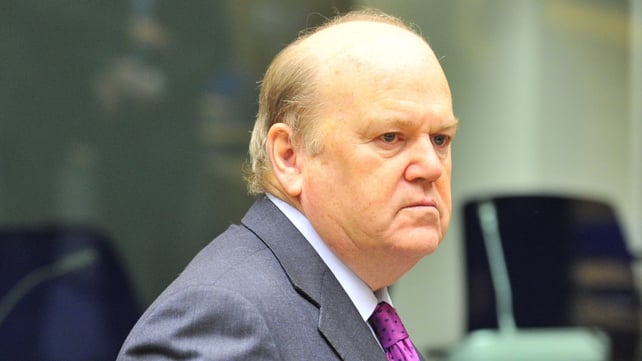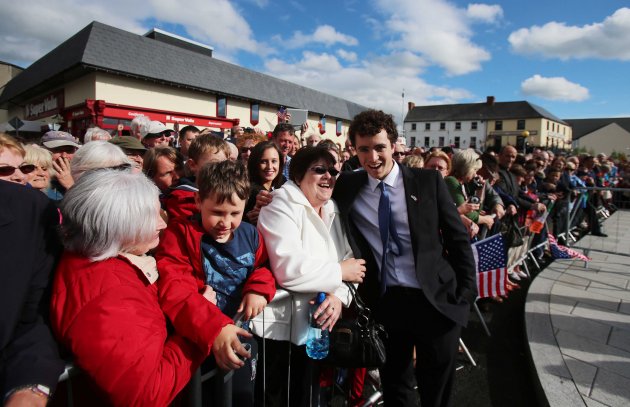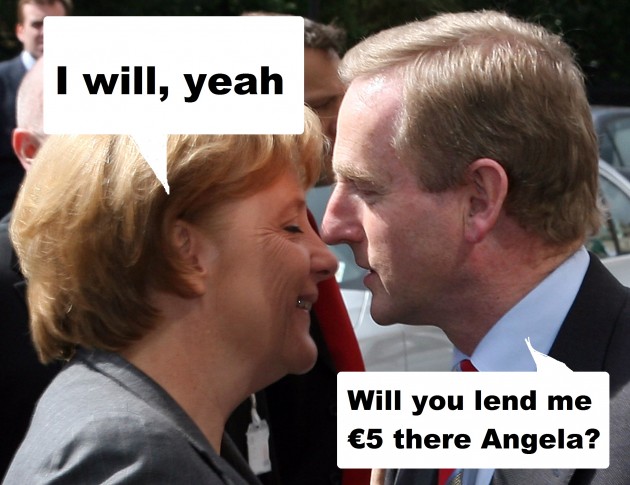12% Of Irish won’t benefit from water charge measures, says Michael Noonan


MICHAEL NOONAN (R) SAID THE DOUBLE IRISH SCHEME WOULD BE PHASED OUT
Minister for Finance Michael Noonan has said 12% of households will not benefit from Budget measures designed to alleviate the water charges, but the Government is examining how to reach them.
Mr Noonan and Minister for Public Expenditure and Reform Brendan Howlin faced the verdict of listeners in a phone-in on RTÉ’s Today with Sean O’Rourke this morning.
He said the aim of Budget 2015 was to spread the recovery throughout the country as a whole.
Minister Noonan also said if the Government mirrors what it did this year for the next two years, around 15,000 extra jobs will be created.
Speaking this afternoon, Minister Noonan rejected suggestions by the Opposition that any gains in the Budget are cancelled out by the water charges.
He said that if you take a couple, both earning €50,000 each, the tax reliefs in the Budget are worth €1,200 for them.
Meanwhile, the debate over the taxation and spending measures in the Budget continued in the Dáil today.
The Opposition accused the Government of introducing unfair tax measures that favour the better off over low paid workers.
The Taoiseach said 400,000 workers have no liability for the Universal Social Charge.
Enda Kenny added that the Government’s three year Budget plan would ease the burden of the 52% marginal tax rate.
The debate on the Budget continues in the Dáil until 9pm this evening.
Budget 2015 contains a range of new measures aimed at reducing the tax burden.
They include changes to the Universal Social Charge and an income tax cut of 1% for the highest earners.
A tax relief in respect to water charges and a €100 payment under the Household Benefits package is being extended to help more social welfare recipients.
There were no new cuts to social welfare rates in this year’s Budget.
The Government announced the introduction of a new Back to Work Dividend to encourage lone parent families and long-term unemployed back to work.
Child Benefit will increase by €5 per child next year. If possible, there will be a further €5 increase in 2016.
The Christmas Bonus has been partially restored, so welfare recipients can expect a 25% increase in their December payment.
The living alone allowance has been increased to €9 a week.
Addressing social housing needs, the Government has announced an investment of more than €2.2bn over the next three years.
It said 2,500 social housing units will be built next year, with 10,000 houses to be built by 2018.
It allocated €10m to tackle homelessness, a move that has been welcomed by campaigners.
In education, more than 1,700 new teachers will be taken on next September.
Of these, 920 will be mainstream teaching posts, while there will be 480 new resource teachers and 365 new special needs assistants.
In justice, 200 new gardaí will be recruited in the next four months and €10m has also been secured for the garda fleet.
Prescription charges, emergency department fees and hospital bed charges have been frozen.
It has also been announced that savings of €130 million will be made on drugs and agency staff in health.
Budget a ‘recipe to grow the economy’ – Burton
Tánaiste and Minister for Social Protection Joan Burton has said yesterday’s Budget is a recipe to grow the economy and to get more people back to work.
Speaking on RTÉ’s Morning Ireland, Ms Burton said on the spending side, people who have children will get an increase in Child Benefit and there is a partial return of the Christmas bonus.
Minister Burton acknowledged that the increases are small but said the focus of this Budget was on creating jobs.
She said the €100 tax credit will make water charges more affordable.
The Tánaiste said in terms of water charges, many people who are not earning enough money to pay tax, live in a household where another person in the household will be claiming either the tax relief or be entitled to the social welfare €100 benefit.
She said the situation will have to be looked at for those who do not fall into that category.
OECD welcomes ‘Double Irish’ plans
Earlier, the Organisation for Economic Co-operation and Development (OECD) welcomed a measure in the Budget to end a scheme known as the “double Irish”, a corporate tax loophole.
Minister Noonan said he was ending the scheme for new entrants and phasing it out over six years for companies already based in Ireland.
Pascal Saint-Amans, Director for the OECD’s Centre for Tax Policy and Administration, said the measure would make for a level playing field and is a very courageous step.
The move sends out a very strong signal that Ireland wants to be competitive, but does not want to facilitate double non-taxation, which is of concern to so many countries, he said.
Speaking on RTÉ’s Morning Ireland, Mr Saint-Amans said what the Government has proposed will strengthen its competitive position.
ICTU critical of failure to address water charge issue
The Irish Congress of Trade Unions has criticised the Government for failing to address the problem facing lower income families in paying for water charges.
At a post-budget briefing, General Secretary David Begg acknowledged that the Budget had been expansionary.
However, he said the Government had not fully factored in the problem of affordability of water charges, adding that people were now at the end of their tether.
He said congress had proposed a system of water credits to take the lower paid out of the water charges net.
He said congress would not have reduced the 41% tax rate, but would have concentrated most of the largesse for tax reductions towards water charges and those on lower end of income scale.
Mr Begg said by giving people at that level extra money, it would all be spent in the local economy on essential rather than luxury goods.
He also voiced scepticism about the claim that 30,000 hospitality jobs had been created due to the 9% VAT rate for the hospitality sector.
He said ICTU’s calculations reckoned that only 2,500 of those jobs were directly attributable to the VAT cut and noted that the tax cut had cost €450 million.
Mr Begg claimed there would have been a better return for the economy with better quality jobs if that money had been invested in infrastructure.
He also described the failure to allocate additional funding for capital investment as a missed opportunity, and warned that the Irish rate of such investment is less than half the EU average.
‘Ireland’s recovery is the people’s recovery’
SAY’S TAOISEACH AS HE OPENS ONE YOUNG WORLD SUMMIT IN DUBLIN


Taoiseach Enda Kenny has told a global summit of young people gathered in Dublin that Ireland’s economic recovery “was and remains a democratic privilege, a national obligation.”
Addressing delegates to the One Young World conference of some 1,400 young leaders at the National Convention centre, he described the recovery as “the people’s recovery”.
“Because it is through our recovery that this, and future generations, could fulfil their right and desire as citizens of this republic of this ‘one world’. And that is to live a dignified, meaningful life. ,” he said.
However he said the unemployment figures amongst our young people was ‘intolerable’.
“To you, as young leaders, I reprise what I told the European Parliament. That the unemployment figure amongst our young people is intolerable,” he said.
” As leaders we must not allow a generation to grow up believing that democracy itself has failed to give them a reasonable chance in life. Because it is they who are democracy’s future, Europe’s tomorrow, our Union’s hope. “
Meanwhile he talked of the importance of environmental initiatives and sustainable living, saying: “Because if we do not, then for our children and grandchildren, it won’t be a question of how they will live in a world of nine billion people. But rather one of whether they will be living at all.”
The conference was opened by host Ryan Tubridy and addressed by Bob Coggins and Clara Kelleher who brought the global event to Dublin.
Delegates were entertained by the Ballymun Children’s Choir.
One Young World founders David Jones and Kate Robertson were also on stage.
It is estimated that the event over the next three days will be worth up to €3m to the local economy.
Key note speeches will be delivered later this evening by One Young World Counsellors, former President Mary Robinson and Sir Bob Geldof.
Kofi Anaan, former UN Secretaray General and will be five former and current Latin-American Presidents are also in attendance, along with Wikipedia founder Jimmy Wales and many others.
What have politicians got against older people?
Minister for Finance Michael Noonan and Minister for Public Expenditure Brendan Howlin, on the Seán O’Rourke programme on RTÉ radio today.
Minister for Finance Michael Noonan and Minister for Public Expenditure and Reform Brendan Howlin have completed their traditional post-budget radio interview on RTÉ, fielding questions from listeners who consider themselves adversely affected by the budget.
John, a pensioner from Mallow, Co Cork, described the return of a quarter of the Christmas bonus as “derisory” and urged the Ministers to think about older people, those who were sick and young people.
“What have politicians down the ages got against older people? They seem to love to cut the gains that we’ve fought for and there’s no justice.”
Mr Howlin said he understood what John was saying but he did not agree with it.
James from Donegal, on an invalidity pension and married to a woman on illness benefit, asked the Ministers what had been given back to him, other than the partial Christmas bonus.
“Is it worth working at all?” he asked. Mr Howlin asked him to leave his details, and said he hoped the additional payment of €48 euro at Christmas time would be a small help.
James said the motorised transport grant had not been replaced after two years. Mr Howlin said the Government was in the process of putting in place an alternative that would the meet needs of people.
Brian, a self-employed worker, asked Mr Noonan about people who earned more than €100,000.
He asked Mr Noonan how he could justify politicians paying eight per cent in USC and self-employed people 11 per cent. “Either raise the 8 to 11 or lower the 11 to 8,” he said.
Mr Noonan said the two situations were not comparable but the gap was “wider than one can justify”. He said that what was announced yesterday was a three-year programme and “we’ll see where it goes in year two and year three”.
David described himself as a reformed smoker. Nevertheless he was concerned about the increase in the price of cigarettes.
Mr Noonan said the increase was a health measure and a disincentive especially for young people, rather than a revenue raising measure.
Another caller, Brendan, had a question about tax individualisation. He described him as a stay-at-home dad in a poor household. He said the tax individualisation system was unequal and unfair to families like his.
Mr Noonan said individualisation had bedded in now and was an integral part of the tax system. Mr Howlin said the Government had been given independent advice to retain tax individualisation.
The caller, Brendan, said the measure had been brought in by the “Darth Vadar of Irish economics, Charlie McCreevy”.
Mr Howlin said it would cost €700 million to revert to the situation pre individualisation.
Mr Noonan agreed with the caller that he had criticised it at the time, but said society had changed. However, he added: “I’ll see can anything be given by way of an individual allowance”.
Shortly before 10.50am, Jane, the first and only woman caller asked a question about working families with very small children. Why was there no second free pre-school year, she asked.
Mr Howlin said it would cost €175 million and he did not have it.
See the monkeys making a new home in Scotland

THESE MONKEYS HAVE RELOCATED TO SCOTLAND FROM GIBRALTAR TO SET UP A NEW HOME.
The troop of 30 wild Barbary macaques are now in quarantine at Blair Drummond Safari Park, near Stirling.
The animals were flown from Gibraltar to Gatwick Airport before completing their journey on land.
 But the reason why the monkeys relocated is an interesting one – a deal was struck with the Gibraltar government to help reduce the territory’s monkey population.
But the reason why the monkeys relocated is an interesting one – a deal was struck with the Gibraltar government to help reduce the territory’s monkey population.
Ministers said exporting the macaques was preferred to culling the animals, whose rise in numbers has been causing problems for local residents
 Their new home is a “luxury” heated house and a 2.5-acre (1 hectare) enclosure with a swimming pool and trees to climb in.
Their new home is a “luxury” heated house and a 2.5-acre (1 hectare) enclosure with a swimming pool and trees to climb in.
From March next year visitors will be able to see the macaques in a new drive-through section of the park.
 Gibraltar environment minister John Cortes said the transfer was the first large-scale export of macaques since 1990.
Gibraltar environment minister John Cortes said the transfer was the first large-scale export of macaques since 1990.
The group of monkeys, which includes three babies, were known as the “Middle Hill Troop” and lived between the top of Gibraltar rock and the town, where they had been causing problems for residents.
 Craig Holmes, head of the macaque section at Blair Drummond Safari Park, said: “They had been moving down into the town and they’re not stupid, they’re clever, they know that there’s food down there. People leave bins out and tourists feed them as well.
Craig Holmes, head of the macaque section at Blair Drummond Safari Park, said: “They had been moving down into the town and they’re not stupid, they’re clever, they know that there’s food down there. People leave bins out and tourists feed them as well.
“They were just working their way down and they were causing problems for the local people, making a mess in their gardens, ripping open their bags to get to the food. So they’re reducing the numbers to try and slowly move them out of the town and encourage them back up on to Gibraltar rock.”
 A macaque named Sir Scoffalot explores the quarantine enclosure.
A macaque named Sir Scoffalot explores the quarantine enclosure.
The macaques left Gibraltar yesterday and arrived at the safari park at about 7.15am today.
Holmes said: “They seem to have settled in really well. They are grooming each other, they are all foraging around for food, drinking, so they all seem quite happy considering they’ve had a long journey.”
The monkeys will spend 30 days in quarantine before moving to their new enclosure.

No comments:
Post a Comment